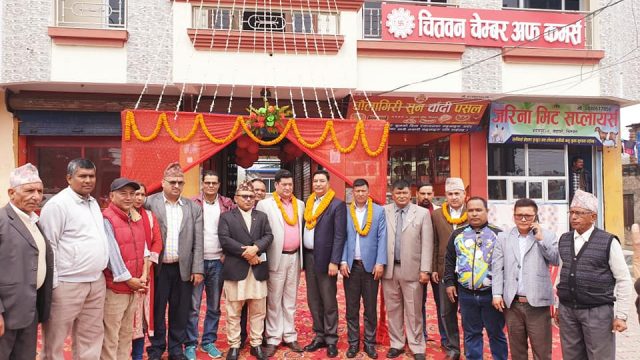China’s Prime Minister Li Keqiang says the country faces a tough struggle while he laid out plans to prop up the country’s economy.
Inaugurating the annual session of China’s parliament, Prime Minister Li forecast a slower growth of 6 percent to 6.5 percent this year, which is down from a target of around 6.5 percent last year, agency reports said.
China, which has been struggling with a slowing economy and trade war with the US, plans to boost spending. It also plans to increase foreign firms’ access to its markets, as well as cut billions of dollars in taxes, according to reports.
He said China now must be prepared for a tough struggle adding the country will face a “graver and more complicated environment”, risks and challenges. (Agencies)
WASHINGTON/NEW DELHI: US President Donald Trump is all set to end preferential trade treatment for India that allows duty-free entry for $ 5.6 billion worth of the country’s exports to the United States.
According to US tofficials, it would take at least 60 days for the country to scrap the concessions following notifications to Congress and the Indian government.
Trump Administration had been urging India to reduce the tariffs to cut the country’s trade deficits.
“I am taking this decision after India did not assure the United States that it would provide equitable and reasonable access to the markets of India,” Trump said in a letter to congressional leaders.
If US removed India from its participation in the GSP program, it would be the strongest action for the South Asian nation since Trump took office in 2017.
KATHMANDU: The Nepal Oil Corporation (NOC) has assured that the import of cooking gas (Liquefied Petroleum Gas) has been sufficient to meet the demands.
It has urged the consumers not to run after rumors of LPG shortage. The NOC issued a statement at a time when LPG dealers and bottlers have announced protest programs demanding an increase in the commission.
The NOC has asserted that there was no fuel shortage in the market and that loading and import of cooking gas has been regular.
NOC spokesperson Birendra Goit said NOC imported 35,754 metric tons of cooking gas alone in February.
BANEPA: Nepali Ambassador to the United Arab Emirates (UAE) Krishna Prasad Dhakal has said his topmost priority would be to secure the welfare of Nepalis in UAE.
The newly-appointed ambassador Dhakal said he would discharge his duty with gratitude and in good faith during his tenure. “I will serve the Nepalis in the UAE with priority,” he said while speaking at a program in Kavrepalanchowk today.
Dhakal stated that since there has been a tremendous prospect of economic diplomacy with the UAE, he claimed that Nepal can export green vegetables, fruits, water and horticulture produce as well as other agro-based produces to the UAE.
“This will also be in my priority list,” he added. On the occasion, Ambassador Dhakal pledged to coordinate efforts with the business community in UAE to attract investment here in the country.
SYDNEY: As the United States and China gear up for signing a trade deal, oil prices firmed on Monday, ending a tit-for-tat tariff row that has roiled financial markets across the globe.
International Brent futures were at $65.25 a barrel at 0022 GMT, up 0.3 percent, from their last close. Brent fell 1.5 percent on Friday.
U.S. West Texas Intermediate (WTI) crude futures were at $56.05 per barrel, up 0.5 percent. WTI futures fell 2.5 percent on Friday.
The rally came as signs that the United States and China will finally ink a trade deal eased fears about global demand growth.
Given the progress in talks between the two countries, US President Donald Trump and Chinese President Xi Jinping could reach a formal trade deal at a summit around March 27, the Wall Street Journal reported on Sunday.
(Agencies)
KATHMANDU: Prabhu Bank is set to distribute an 8 percent bonus shares for its shareholders from the net profit of FY 2074/75.
The 17th Annual General Meeting of the bank held at the Prabhu Bank’s Head Office at Babarmahal decided to distribute the share to its shareholders.
According to the bank, the current capital of the bank stands at Rs 8 arba, 89 crore, 26 lakh 78 thousand 9 hundred.
Prabhu Bank, currently has a total of 12 lakh customers throughout the country, including 10 extension counter offices, 132 ATM machines and 165 branch offices.
Likewise, the bank has also decided to expand its services by opening 28 new offices in various parts of the country.
KATHMANDU: Chairman of Nepal Chamber of Commerce (NCC) Rajesh Kaji Shrestha inaugurated NCC offices in Chitwan and Pokhara.

On the occasion, Shrestha expressed the view that the new offices would work closely with the members of the NCC as well as the entrepreneurs in the districts.

HETAUDA: Though Nepal is known as an agricultural country and a country rich in water resources, around 800 thousand arable land remains unirrigated, accord to a report by the Ministry of Energy, Water Resources and Irrigation.
Of total 2.2 million hectares of arable land, only 1.4 million hectare has irrigation facility. Sources of irrigation in Nepal include underground water, well, canal and river.
KATHMANDU: President of the Asian Infrastructure Investment Bank, Jin Liqun, has assured of a senior level representation from AIIB in the Nepal Investment Summit to be held in Kathmandu in March.
The Embassy of Nepal in Beijing informed that Liqun has assured that AIIB would also continue to lend its support to Nepal’s development endeavors.
According to RSS, Liqun gave the assurances during his meeting with Chief Executive Officer of Investment Board of Nepal, Maha Prasad Adhikari, in Beijing on Tuesday.
CEO Adhikari, during a meeting with Liqan, informed him about the Summit expressing the confidence that AIIB’s support would be crucial in Nepal’s socio-economic development.
The AIIB President is also learnt to have pledged funding for the projects forwarded by the Nepal government. CEO Adhikari is in Beijing to participate in Pre-Investment Conference organized by Embassy of Nepal in China.
KATHMANDU: Smuggling of invaluable medicinal herbs continues unabated in Nepal.
Authorities have claimed that high demand for the rare medicinal herbs in the markets of India, China, and other countries has tempted smugglers towards this lucrative business.
Around 7 hundred species of medicinal herbs are available in Nepal, according to a study conducted by the Department of Forests.
These rare species of herbs are going to be extinct if not protected by the government. The unbridled smuggling has posed a serious threat to the herbs.
Ayurvedic pharmaceutical industries, including the government-owned Singha Durbar Vaidyakhana, have complained that they are facing a shortage of medicinal herbs in recent times.
Herbs worth Rs millions smuggled
The absence of effective monitoring has encouraged smugglers to smuggle these herbs.
On February 8, police arrested a person Sher Singh Dhami, 48, with 715 kilograms of Setak Chini, locally known as Khiraula, concealed in a house at Chainpur of Bajhang district. Dhami, who originally hails from Apihimal Rural Municipality, Dharchula, landed in police net while he was preparing to smuggle the herbs to India.
On October 30, a squad of Armed Police Force (APF), Kalabanjar seized 75 kilograms of spikenard (Jatamasi) from Duduwa Rural Municipality of Banke.
Similarly, on September 22, police rounded up Mane Rokaya with 1,012 kilograms of Setak Chini in Budhinanda Municipality of Bajura.
Rokaya had collected Setak Chini from a nearby jungle which is priced at Rs 1,600,000 per kilogram in the local market. He was held while he was preparing to smuggle it to India in cahoots.
Influential mafias, according to police, have a hand in smuggling. They, residing in India, smuggle Nepal’s herbs to various countries via India.
These incidents are only the tip of the iceberg. The statistics maintained by the Nepal Police has shown that herbs worth millions of rupees are seized annually.
Police seized herbs worth Rs 16.6 million from Karnali Province in the Fiscal Year 2017/18 alone. Likewise, various types of herbs were seized from Kalikot, Mugu, Rolpa, and Rukum while they were being smuggled to India.
SSP Uttam Raj Subedi, the spokesperson of Nepal Police, admits the smuggling of herbs to India through porous borders.
“Priceless herbs available in Nepal are mostly smuggled to India. Only small portions of the herbs are illegally sold in the third country,” said SSP Subedi.
Influential mafias, according to police, have a hand in smuggling. They, residing in India, smuggle Nepal’s herbs to various countries via India.
Herbs are seized when setting fails
Herbs are collected from Nepal’s hilly districts, including Kalikot, Mugu, Humla, Jumla, Dolpa, Jajarkot, Darchula, and Bhajhang. Locals collect herbs in cahoots with the forest officials, local representatives and police despite government’s ban on the collection of such herbs.
“Herbs are smuggled in cahoots with locals, local representatives and police,” an official at the Ministry of Forests and Environment told Khabarhub on the condition of anonymity.
The herbs are seized when a disgruntled police official informs the higher authority about it after he is deprived of his pie.
According to herbs trader, the herbs are seized when setting among the local representatives, forest officials and police fails.
Nepali pharmaceutical deprived of herbs
With the Nepal government’s ban on the collection of some certain herbs, Nepal pharmaceutical companies are facing the shortage of herbs, entrepreneurs said.
Government-owned Sindha Durbar Vaidyakhana Development Committee had called for a quotation seeking 91 items of herbs in the fiscal year 2016/17. However, only 40 items of herbs were made available.
A quotation seeking 300 kilograms of Hadchur had been announced in the fiscal year 2017/18.
Vaidyakhana has not been able to meet the demands of Ayurvedic medicines due to the shortage of herbs, said Hari Prasad Yadav, acting chief of Vaidyakhana Development Committee.
No conservation despite the ban
The government has not taken any initiation to protect invaluable herbs despite a ban imposed on their collection.
These rare species of herbs are going to be extinct if not protected by the government. The unbridled smuggling has posed a serious threat to the herbs.
Besides, fire, deforestation are the other causes leading to the disappearance of such priceless herbs.
“The government has to either bring concrete plans to protect these herbs or lift the ban on their collection,” said a trader.